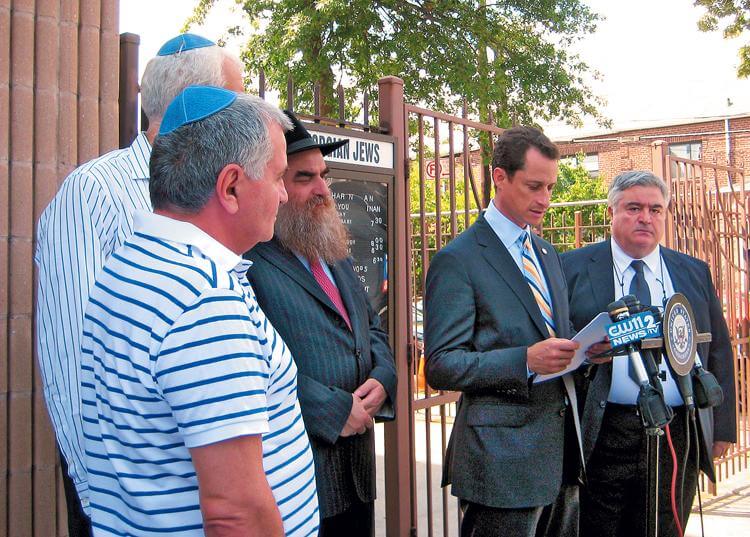By Alex Christodoulides
U.S. Rep. Anthony Weiner (D-Forest Hills) brought the Georgian conflict home to his Queens constituents, holding a listening session and news conference outside the Congregation of Georgian Jews in Rego Park last week so the borough's Georgians could discuss their worries about Russia's recent invasion of their homeland.
“We are shouting out loud for the tragedy in their homeland while that war rages,” Weiner said. “Many of my neighbors who've contacted me want to know how they can find their relatives, and when will it end.”
The conflict in Georgia began Aug. 8 when Russia invaded the region of South Ossetia in Georgian territory. The Ossetians have sought on and off since the early 1990s to become independent from Georgia and turned to Russia for support.
Tensions have been rising in the separatist region of Abkhazia, which also sits inside Georgia's borders. Despite a French-brokered cease-fire agreement signed last week between Georgia and Russia, news reports from the area say the fighting in the region has continued and Russian troops have not left.
“This is the most violent cease-fire I've ever seen,” Weiner said.
For many of Queens' and New York's estimated 5,000 to 6,000 Georgians, their inability to communicate with relatives in Georgia feeds their anxiety.
“I have family on the Black Sea — my mother-in-law and father-in-law — and we can't contact them. They're very close to the war zone,” said Tina Kenia. “There is no news. I can't function.”
Michael Khanan was worried about Georgia's diplomatic future.
“This is an outrage. It takes hundreds of years to build the right relations between nations,” he said. “We'll do everything possible to rebuild it.”
Dimitri Tvildiani thought the invasion was a ploy by Russia to control the Nabucco Pipeline, a planned natural gas delivery route which would go from the Caspian region to Austria via Georgia, bypassing the current routes through Russia.
“This is not a local problem. It is not Ossetia and Abkhazia. On Aug. 8, the new wave of the Cold War started,” Tvildiani said. “Russia has gained a lot of money, and they tried to gain hegemony. Ideas failed, weapons failed, now they are trying fuel. They want to gain control of the whole pipeline.”
Some Queens residents with Russian roots also deplored the fighting. Irene Dutikow, wife of the pastor at the Holy Trinity Russian Orthodox Church in Astoria, said the majority of the church's 80 parishioners were born in Russia.
“They're all very appalled at what's happening,” she said. “It's Putin's thing. He's just trying to be nasty. He shouldn't do what he's doing. He shouldn't go in there.”
New York's Georgian community, many of whom fled Georgia during the last wave of separatist fighting in 1994, just wants the violence to end.
“Tell them to stop the war, take their military and go,” said Gela Gelashvili, an event producer based in Forest Hills.
Zurab Buziashvili, a Manhattan-based engineer, said he did not want to see sanctions imposed on Russia.
“We'd ask for peace,” he said. “Whatever you call it, pull out. There's no winner on either side if a war starts, so it's best to resolve it in a civil way.”
Jeremy Walsh contributed to this article.



































